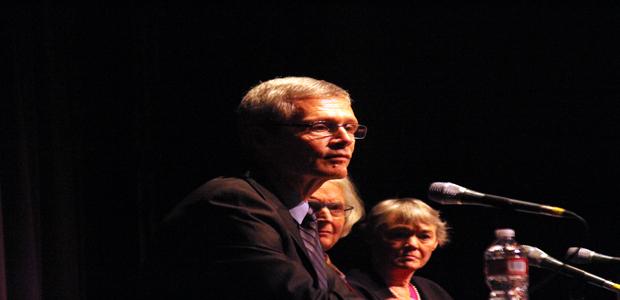Four decades before Edward Snowden released classified National Security Agency documents that exposed massive government spying, a group of eight activists called the Citizens’ Commission to Investigate the FBI broke into an FBI office in Media, Pa. Although lacking experience at burglary, they managed to loot more than a thousand documents revealing illegal surveillance and intimidation of American citizens.
“We had learned our burglary skills in the Draft Resistance Movement from priests and nuns,” said Bonnie Raines, who joined the commission alongside her husband John.
Prior to the break-in, the Raines were active protestors of the Vietnam War, having participated in various forms of civil disobedience, including rallies, marches, and petitions. The country had been in turmoil over the war, with opponents actively challenging the government and the draft. The Raines even broke into draft boards in the middle of the night to destroy draft files in an attempt to “disrupt the war machine.”
“It was a very distressing time for me and other activists,” Bonnie said. “We were very frustrated because nothing that we were doing to have our voices be heard was having any impact whatsoever. That felt very much as if the government was not only not listening to us, that we as the people had no voice that was being listened to, but in fact that our efforts were being opposed.”
On Jan. 28, the Raines visited the campus as part of the Lessons in Courage and Resistance tour. Joining them was Betty Medsger, the journalist who reported on the stolen files when they were first released, and author of “The Burglary: The Discovery of J. Edgar Hoover’s Secret FBI.” Medsger’s book takes an in-depth look at the necessity of the activists’ actions and how they pertain to society today, particularly since Snowden’s leaks in 2013 revealed a widespread pervasive government assault on privacy not unlike the FBI’s action in the 1960s and 1970s.
“Lessons in Courage and Resistance tour — that’s what this is about, and how fortunate that we at Glendale Community College got to be apart of that tour so that our students, educators, and staff have an opportunity to think about what that means — lessons in courage and resistance,” said college President David Viar.
Crowds of students, professors, and staff gathered in the auditorium at 11 a.m. to watch a pre-release screening of “1971,” a documentary by Johanna Hamilton that was based largely on Medsger’s book. The film was followed up by a lunch break and book signing at 12:30, after which Viar moderated a panel featuring Bonnie and Medsger. John Raines was not present during the panel portion because he had to catch a flight back to Philadelphia soon after the movie screening began.
Organized by history professor Marguerite Renner at Glendale College in conjunction with the American Civil Liberties Union, the group also spoke at Caltech, Loyola Marymount University, and Occidental College.
As Bonnie walked up the auditorium steps, the boldness of her actions 44 years ago fell into perspective. Despite having three children under the age of 10 at the time of the burglary, she was prepared to risk prison time for the sake of civil dissent and she said she would do it again today in similar circumstances.
She and the other activists were convinced that the FBI was actively trying to break the peace movement and suppress their right to protest the war.
“The FBI was everywhere,” Raines said. “They were taking our photos, they were placing informants in our groups when we would meet, [and] they were intimidating in many, many different ways. We all knew that was going on and we were all very worried about what impact that might have on our ability to dissent.”
Hoover was the first and only director of the FBI at the time the burglary took place. A harsh and authoritarian figure, he ran the agency for almost 50 years.
“You have to understand that at that time, the FBI was J. Edgar Hoover’s FBI,” Bonnie said. “He shaped that organization in a way that reflected his own biases. He could characterize pretty much anyone whose opinions differed from his own as subversive, and he did that.”
Despite Hoover’s autocratic reign, the public revered him; however, politicians feared him. He had files of many members of Congress, using their personal secrets as leverage that could damage their careers. Ultra conservative and racist, Hoover resented students, hippies, blacks, Jews, and pretty much anybody whose beliefs did not align with this own.
“The American public idolized him without knowing anything about what was truly going on in the FBI, so his authority was never questioned and that had to happen for the first time a bold way outside of the government,” Bonnie said.
The Raines and a number of others were approached by William “Bill” Davidon, a respected peace activist and physics professor, and asked if they would consider breaking into an FBI office and removing all of the files to try and obtain documentary evidence of the FBI’s actions.
“I learned later, when I was working on the book, that Bill Davidon had come to the point by late 1970 where he felt that there were two wars going on — there was the war at home against dissent and there was the war in Vietnam, and that it was equally important to oppose both of those wars.”
Because the Raines believed none of their representatives in government were doing their jobs and overseeing the FBI, they — as ordinary citizens — shouldered the responsibility of taking direct action.
“John and I took our responsibilities as citizens very seriously and we had done that throughout the civil rights movement and during the opposition to the war,” Bonnie said. “We had three children under the age of 10, but we felt that you don’t stop being a citizen when you become a parent, and in fact it’s even more important to be vigilant as a parent. We thought that to not act when we saw something so very, very wrong, and to not act in concert with others who were resisters would be a copout.”
Davidon’s proposal soon became a reality, and the Citizens’ Commission to Investigate the FBI was formed. Despite a massive manhunt that ensued, the activists were never caught and stayed true to their promise to keep quiet and never associate with each other. Other members who helped orchestrate the break-in were Keith Forsyth, who picked the lock of the Media office, Robert Williamson, and Judi Feingold. Two other members have not gone public. It was not until the release of Medsger’s book last year that the identities of the burglars were finally revealed.
On the night of the historic burglary, Bonnie waited in a car on a side street next to the building while John waited in a parking lot at Swarthmore College. Once the others secured the files, they took them to John’s station wagon. That night, the burglars travelled to a farmhouse an hour outside of town, spending the next few weeks sorting out the documents before sending them to select journalists.
Medsger was one of those journalists. What she found in those files was mind-boggling.
“The first file that I read instructed FBI agents to enhance paranoia and for FBI agents to behave in such a way that Americans would feel as if there was an agent behind every mailbox,” she said.
The documents also led to the discovery of COINTELPRO, a counter-intelligence program that sought to dismantle various groups that Hoover labeled as threats to national security, including but not limited to the Black Panther Party and the Communist Party of the United States. One of Hoover’s most famous quarries was Martin Luther King Jr.
African Americans were also relentlessly targeted, as Hoover had agents follow them anywhere and everywhere, such as churches, schools, or bars. For example, every black student at Swarthmore College in Pennsylvania was under surveillance and agents had files on them. This type of spying was taking place throughout the entire country.
Sheridan Defrance, a student who attended the panel, said she was saddened to learn how African Americans were further persecuted during that time.
“I want to make it clear that we are not talking about people who were suspected of crime,” Medsger said. “We are talking about African Americans in general and that was one of the most important discoveries—that much of what was happening was completely unrelated to law enforcement. In fact, it was illegal and it was not good intelligence gathering because it did not lead to anything.”
Bonnie said her belief in the decision to take such a risk was further confirmed when their actions led to the first congressional hearing of American intelligence agency. Senator Frank Church formed a committee to investigate the FBI and the CIA, resulting in restrictions on their ability to spy on the public.
However, after the 9/11 attacks induced mass fear and paranoia of terrorists, intelligence agencies like the NSA once again ran rampant on surveillance programs, a fact that was confirmed to the public when Snowden made the decision to become a whistleblower.
“We see surveillance creeping back into our government,” Bonnie said. “I think that we are only in a position to begin to question how tremendously damaging that can be to our constitutional rights and to our personal everyday lives, as well as to the way that government operates.”
As Medsger and Ronnie spoke to the audience, their faces in partial silhouette, Davidon’s absence was noticeable in the auditorium. The burglars trusted Bill’s leadership, which is why they went ahead with their plan to raid an FBI office.
Although he died in November 2013, just before Medsger’s book release, he had been involved in the process of the burglars coming out with their identities from nearly the beginning. Medsger would send chapters of the book to Colorado, where his daughter would read them to him.
“I think Bill would want to ensure that in the process of telling the story about 1971, that we continually bring it up to the present and show the parallels and get those messages out there,” Bonnie said. “He would want to insist that we bring Mr. Snowden into the discussion, as well as other whistleblowers.”
Despite the tumultuous state of the country during the Vietnam War, Davidon was optimistic in the power of ordinary citizens to make a difference.
“Bill had such a strong sense that if you got the truth out, that the public would read and do something about it,” Medsger said. “ He certainly was right in the incident of the burglary and it took a lot of optimism to believe in that at the time.”
The panel discussion ended with a standing ovation from the audience.
Leana Mosesian, a Kinesiology major, said she found the commission’s actions “gallant and extreme” but “worthwhile.” Mosesian, who met Raines during the book signing, described her as “spunky,” and was surprised that she seemed like such an “ordinary” individual considering her involvement in the burglary.
The idea of “ordinary citizens” taking action is one that Raines wanted to communicate and was pleased that it made it into “1971.”
“As students and educators, we are about learning and developing strong critical thinking skills,” Viar said. “We hope that as students leave Glendale Community College, [they] will know how to ask the rights questions, how to challenge others to ask the right questions, leading to informed and thoughtful decision making that will in fact lead to a better world.


